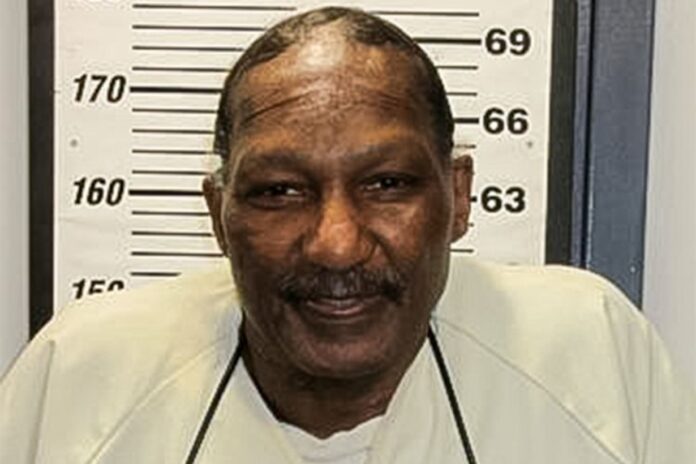- Tennessee carried out the execution of Byron Black despite repeated warnings that his implanted defibrillator might deliver painful shocks during the lethal injection process.
- Witnesses reported Black cried out in pain, raising concerns about cruelty and the execution’s humanity.
- Courts blocked legal efforts to deactivate the device, fueling demands for a full investigation and urgent reform of execution procedures.
In a grim and unsettling scene at Nashville’s Riverbend Maximum Security Institution, Byron Black, a 69-year-old inmate on death row, was put to death by lethal injection Tuesday morning. The execution, however, sparked shock and outrage after witnesses reported that Black appeared to suffer intense pain during the process. His implanted heart device may have played a horrifying role.
In a grim and unsettling scene at Nashville’s Riverbend Maximum Security Institution, officials carried out the lethal injection of 69-year-old death row inmate Byron Black on Tuesday morning. The execution sparked shock and outrage as witnesses reported that Black showed signs of intense pain during the process—his implanted heart device may have played a horrifying role.
Black’s death marks a disturbing chapter in Tennessee’s capital punishment history. He was convicted for the brutal 1988 murders of his girlfriend, Angela Clay, and her two young daughters, aged six and nine. Black had been awaiting execution for more than three decades. Despite pleas from his legal team and medical experts warning that his implantable cardioverter defibrillator (ICD) could interfere with the lethal drugs, the execution moved forward. Experts argued it could cause repeated painful shocks to his heart.
Disturbing Witness Reports Stir Outcry
According to multiple witnesses present during the execution, Black showed clear signs of distress throughout. Observers described groaning, gasping for air, and visible signs of pain. One of the more chilling moments was when Black reportedly cried out, “It’s hurting so bad.” These haunting words shattered the typical silence surrounding executions. They raised serious ethical and legal questions.
Black did not deliver any formal last words, but those few desperate cries spoke volumes. The disturbing account of his suffering has ignited public debate on the safety and humanity of lethal injections. This is especially important for inmates with severe medical conditions.
The Defibrillator Debate: Life-Saving Device Turns Deadly
At the heart of the controversy is Black’s implantable cardioverter defibrillator—a device designed to monitor and correct dangerous irregular heart rhythms by delivering electrical shocks to the heart. While lifesaving in many situations, experts warned that during a lethal injection, the device could activate uncontrollably. This could inflict pain and disrupt the intended effects of the execution drugs.
Black’s attorneys fought hard in the weeks leading up to Tuesday’s execution to have the defibrillator deactivated. They argued that failure to do so would amount to cruel and unusual punishment, violating constitutional protections. “I interpret that my client was tortured today,” attorney Kelley Henry told NBC News shortly after the execution.
Initially, a lower court agreed, ordering the device to be turned off before the procedure. However, Tennessee’s Supreme Court later reversed that decision, stating the court lacked jurisdiction to intervene in the execution protocol. Adding to the dilemma, Nashville General Hospital, where the device had been implanted years earlier, declined to assist with deactivating it. They cited ethical concerns. The hospital refused to participate in what it deemed an execution, leaving the state without the cooperation needed to safely disable the device.
Health Issues and Legal Battles: A Troubled Inmate’s Final Days
Beyond the defibrillator, Black’s health was rapidly deteriorating. He suffered from intellectual disability, advanced heart failure, kidney failure, and progressive dementia. At the time of his death, he was wheelchair-bound, an image starkly contrasting the often vigorous portrayals of death row inmates.
His legal team repeatedly appealed for clemency based on these severe medical conditions. They argued that executing a man in such fragile health would be inhumane. Despite these efforts, the U.S. Supreme Court declined to halt the execution. Tennessee Governor Bill Lee also refused to intervene, sealing Black’s fate.
The Fallout: Calls for Investigation and Reform
Following the execution, Black’s lawyers vowed to seek a full autopsy. They demand access to the defibrillator’s internal data to determine if it fired during the lethal injection process. This information could be crucial in assessing whether Black’s suffering was caused by painful shocks from the device, rather than the execution drugs alone.
Legal experts and advocacy groups are watching the case closely. The Washington Post reported that Black’s execution might represent the first documented U.S. case where lethal injection was carried out without deactivating an implantable defibrillator. This unprecedented situation has raised alarms about execution protocols and whether they adequately address the needs of inmates with complex medical issues.
Tennessee’s Death Penalty Back in the Spotlight
Black’s execution is the second in Tennessee this year, coming after the state resumed capital punishment. This happened following a suspension related to earlier problems with its lethal injection procedures. The return to executions has reignited fierce debates over the death penalty, both nationally and locally.
Opponents argue that cases like Black’s reveal the risks of applying lethal injection in a one-size-fits-all manner. Without accounting for individual health conditions, it could lead to torturous deaths. They warn this violates constitutional bans on cruel and unusual punishment. Supporters, however, maintain that the justice system must be upheld. They believe Black’s crimes warranted the ultimate sentence.
Public Reaction: A Divided Nation
Reactions to the execution have been deeply polarized. Some members of the public feel justice was finally served after decades of waiting. However, others express horror at the possibility that Black may have suffered agonizing pain during his final moments.
Advocacy organizations have seized on the case to call for comprehensive reviews of execution protocols across the country. They demand that states establish clear guidelines for inmates with medical implants or serious health problems. Their goal is to prevent similar incidents in the future.




